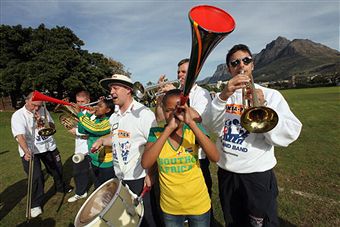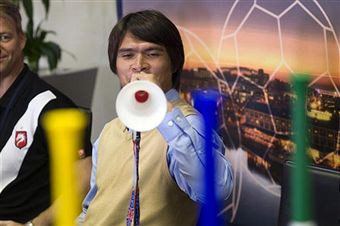By David Owen in Cape Town
June 18 – Neil van Schalkwyk is only 37.
Yet he has already ignited a global phenomenon.
He is co-founder of a company called Masincedane Sport CC which is the biggest vuvuzela manufacturer in South Africa.
Love them or hate them, these raucous plastic horns have become the talking point of this World Cup.
Van Schalkwyk estimates that his company has around a 25 per cent market share in its home market, with the biggest competition coming from informal sellers offering horns presumed to be sourced from China.
He says Masincedane - which means “let us help each other” – has generated 6-7 million rand (£523,000-£610,000/$788,000-$919,000) in turnover in the past decade.
About 50 per cent of that has come in the past 12 months, as the popularity of the instruments has soared.
Van Schalkwyk estimates there are some two million vuvuzelas in South Africa at the moment, with World Cup fever in full spate.
That’s an awful lot of decibels.
Speaking in Cape Town, Van Schalkwyk explained how the idea had come to him while playing for the under-19 team of local club Santos.
“I scored an equalising goal.
“There weren’t many people, but I saw this [horn handmade from tin] in the stadium that day.
“That’s the moment it stuck in my head.”
 For the next four years, Van Schalkwyk spent his evenings in a plastics factory pursuing his idea while also holding down a regular job.
For the next four years, Van Schalkwyk spent his evenings in a plastics factory pursuing his idea while also holding down a regular job.
“I have lost a lot of sleep,” he said, offering apologies to those visiting South Africa - including Franz Beckenbauer – who have lost “a bit of sleep” because of the success of his brainchild.
He said his company now employs 70 people in South Africa, plus an additional 120 vendors.
“It is amazing to see how it has transcended all levels of our society,” he said.
“Horn blowing has been [practiced] here for centuries, so that is where the association came about.
“We have got a multicultural society in South Africa.
“We have got eleven languages.
“This is the 12th language - the vuvuzela.”
Van Schalkwyk, an accomplished vuvuzela player himself, demonstrated a new version of the instrument that he said had been measured at 121 decibels, as opposed to 134-140 for the original product - so a modicum of relief for vuvuzela haters may be at hand.
Ear-plugs are also being made readily available.
With the media exposure afforded by the World Cup, there are now signs of an international market developing.
A German company is licenced to manufacture the instruments for Europe, while Van Schalkwyk spoke of an invitation from a company in Russia - a country that did not even qualify for South Africa - to negotiate an entry to that sizeable market.
Will the vuvuzela in time become as much a hallmark of leading European football leagues as it has been of the 2010 World Cup?
Only time will tell, though personally I have my doubts.
Contact the writer of this story at zib.l1745328928labto1745328928ofdlr1745328928owedi1745328928sni@n1745328928ewo.d1745328928ivad1745328928
Related stories
June 2010: Exclusive – Vuvuzelas are keeping me awake complains Beckenbauer
June 2010: World Cup organisers re-evaluating vuvuzela after complaints

